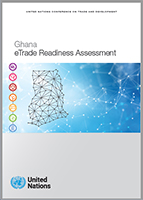
The eTrade Readiness Assessment of Ghana expands UNCTADs ongoing e-commerce technical assistance in West Africa, in alignment with the ECOWAS E-Commerce Strategy adopted in July 2023.
Building on eight national assessments and two regional assessments, for the West African Economic Monetary Union and the Economic Community of West African States, this assessment details the challenges and policy gaps prevalent within Ghana's burgeoning e-commerce sector as well as Ghana's potential to harness national initiatives and government-backed projects to foster the growth of the digital economy.
The main findings are presented below per policy area:
- The government of Ghana has continuously displayed its willingness to promote the development of the digital economy in recent years, including through initiatives launched in the context of Ghana’s Digital Agenda (2018) and the Ghana Beyond Aid Charter and Strategy (2019). However, a strategy dedicated to e-commerce would be key to improve the institutional set-up and coordination in relation to e-commerce policy making.
- While massive investments in ICT infrastructures have been made by the Government of Ghana, leading to an Internet penetration rate of 76 % of the population in 2023, broadband speed and Internet connectivity in rural areas remain a challenge.
- A national digital addressing system has been initiated but the existing state of supply chain of logistics and delivery services limit the development of inclusive e-commerce in the country.
- The Bank of Ghana has initiated the Digitalized payment solutions are increasingly used by the population, supported by the Government’s 2019–2024 Payment System Strategy (Go Digital). Nevertheless, the cost of digital payments remains high for users, who also demonstrate limited trust in digital payments and uptake of debit and credit cards.
- The government of Ghana has adopted a legal framework for e-commerce, which needs to be effectively implemented. A number of national actors need to be made aware of the existing pieces of legislation and the capacities of the judiciary and law enforcement agencies need to be strengthened.
- Although training opportunities for digital skills have increased in Ghana, the e-commerce ecosystem needs further support for digital skills development, including for Ghanaian entrepreneurs, highlighting a mismatch of supply and demand.
- Digital start-ups struggle to attract funding, facing limited appetite from commercial banks, which generally require partners or guarantees. Further support is therefore necessary to expand access to financing for small businesses.
The policy recommendations outlined in Ghana's eT Ready report are strategically tailored to foster a more inclusive and sustainable development trajectory. They are designed to support Ghana's Industrial Transformation Programme and Digitalization Agenda, aligning with ongoing efforts by ECOWAS members to advance e-commerce within the region through the ECOWAS E-commerce Strategy.
This assessment was made possible through the financial support of the E-commerce and Digital Economy Programme Core Donors (Germany, Switzerland, Sweden, and The Netherlands).




